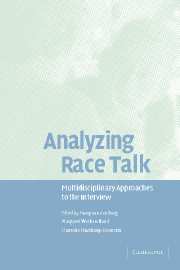Book contents
- Frontmatter
- Contents
- List of contributors
- Preface
- Acknowledgments
- Transcriptions symbols
- Introduction
- 1 Racism and the analysis of cultural resources in interviews
- 2 Analyzing racial discourse: the discursive psychology of mind–world relationships
- 3 Constructivist processes in discourse: a cognitive linguistics perspective
- 4 Institutional, professional, and lifeworld frames in interview talk
- 5 The uses of absurdity
- 6 Multiple voices in talking race: Pakeha reported speech in the discursive construction of the racial other
- 7 Contradictions in interview discourse
- 8 Racism, happiness, and ideology
- 9 The frame analysis of research interviews: social categorization and footing in interview discourse
- 10 Affiliation and detachment in interviewer answer receipts
- 11 Interviewer laughter as an unspecified request for clarification
- 12 Perspectives and frameworks in interviewers' queries
- Appendix: Interview transcripts
- Index
3 - Constructivist processes in discourse: a cognitive linguistics perspective
Published online by Cambridge University Press: 22 September 2009
- Frontmatter
- Contents
- List of contributors
- Preface
- Acknowledgments
- Transcriptions symbols
- Introduction
- 1 Racism and the analysis of cultural resources in interviews
- 2 Analyzing racial discourse: the discursive psychology of mind–world relationships
- 3 Constructivist processes in discourse: a cognitive linguistics perspective
- 4 Institutional, professional, and lifeworld frames in interview talk
- 5 The uses of absurdity
- 6 Multiple voices in talking race: Pakeha reported speech in the discursive construction of the racial other
- 7 Contradictions in interview discourse
- 8 Racism, happiness, and ideology
- 9 The frame analysis of research interviews: social categorization and footing in interview discourse
- 10 Affiliation and detachment in interviewer answer receipts
- 11 Interviewer laughter as an unspecified request for clarification
- 12 Perspectives and frameworks in interviewers' queries
- Appendix: Interview transcripts
- Index
Summary
Introduction
In this paper I attempt to apply the general framework of cognitive linguistics (Fillmore 1982; Lakoff 1982, 1987; Langacker 1987, 1988, 1990, 1991) to the analysis of a particular set of discursive processes in the texts that are the focus of the papers in this volume. The processes in question are (a) categorization, (b) the construction of agency, and (c) conversationalization. By categorization, I mean the process whereby speakers adopt or construct conceptual categories of events and situations as part of the process of explaining and justifying the views they express. By the construction of agency, I mean the process whereby speakers identify what they see as the causative factors responsible for given situations (in this case the disadvantaged position of many Maoris in New Zealand society). By conversationalization, I mean the process whereby speakers mark the assimilation of “counterdiscourses” (i.e. the expression of other points of view) into their turns by such conversational features as oh, sure, OK, yeah, alright, and so on. Before developing these points, however, I should explain why I have chosen cognitive linguistics (CL) as the framework of reference.
One of the most salient ways in which CL differs from other theories of language is the central role of the notion of “construal.” Whereas linguistic theories such as generative grammar tend to assume a level of autonomous semantic structure (represented in early models by the notion of “deep structure,” and in more recent models by that of “logical form”), CL claims that the role of language is not to map some independently structured level of meaning onto linguistic form but to impose a particular “imaging” on a situation (Langacker 1990: 5–15).
- Type
- Chapter
- Information
- Analyzing Race TalkMultidisciplinary Perspectives on the Research Interview, pp. 49 - 63Publisher: Cambridge University PressPrint publication year: 2004



